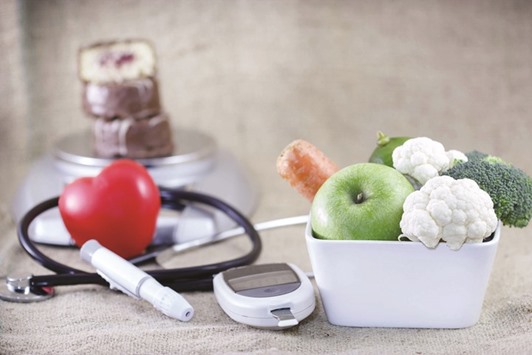
DIET CONTROL: Diabetes prevention is as basic as eating more healthfully, becoming more physically active and losing a few extra pounds.
Diabetes is a group of metabolic diseases in which a person has high blood sugar level because the body does not produce enough insulin, or because cells do not respond to the insulin that is produced. This high blood sugar produces the classical symptoms of diabetes.
Diabetes prevention is as basic as eating more healthfully, becoming more physically active and losing a few extra pounds — and it’s never too late to start. Making a few simple changes in your lifestyle now may help you avoid the serious health complications of diabetes down the road, such as nerve, kidney and heart damage.
Classification of diabetes mellitus
Type 1 diabetes: Pancreas’ failure to produce enough insulin, so required to inject insulin – also called insulin depended diabetes mellitus (IDDM).
Type 2 diabetes: Cells fail to utilise insulin properly, resulting in insulin resistance, also called non-insulin dependent diabetes mellitus (NIDDM).
Gestational diabetes: When pregnant women without a previous history of diabetes develop a high blood sugar level.
Signs & Symptoms
l Increased thirst
l Frequent urination
l Increased hunger
l Sudden weight loss
l Dryness of mouth
l Numbness in the feet
l Itching skin
l Increased fatigue
l Irritability
l Blurred vision
l Frequent infections
Causes and risk factors
l Unknown reasons
l Hereditary
l Obesity and physical inactivity
l High blood pressure (hypertension)
l High cholesterol levels (dyslipidemia)
l Gestational diabetes
l Polycystic Ovary Syndrome
Complications
Diabetes skin infection
Diabetic retinopathy (increased blood sugar affecting the retina).
Diabetic nephropathy (increase blood sugar affecting the kidneys).
l Heart diseases
l Emotional stress
l Diabetic ulcers
l Diabetic ketoacidosis /hypoglycemic coma
l Diabetic neuropathy
l Hearing impairment
l Cataract
Basic knowledge for diabetes patients
l The nature of the drugs he or she takes should be known to him or her.
l Nutritional requirements and diet planning.
l Type and extent of exercise and physical activity.
l Interaction of food intake and physical activity with oral hypoglycemic drugs or insulin.
l Improvements in lifestyle – quit smoking and alcohol.
l Should not be obese under any circumstances.
Many a time, diabetes tend to exist with conditions like hypertensions and high cholesterol levels in the blood (dyslipidemia), it should be noted that the acceptable upper limit of blood pressure/cholesterol differ in a diabetic patient compared to a non-diabetic.
Dietary guidelines
Dietary fat should provide 25% to 35% of total intake of calories, but saturated fat intake should not exceed 10% of the total energy.
Protein intake should be at the rate 0.8 to 1.0 gram per kg body weight. Protein should be from animal and vegetable sources.
Carbohydrate intake should be highly restricted to the extent that it provides just 50% to 55% of the total caloric content of the diet.
Excessive salt intake is to be avoided especially in hypertensive patients and patients with existing kidney failure.
Artificial sweeteners should not be used much.
Alcohol intake must be stopped completely. Alcohol increases the risk of low blood sugar in people taking anti diabetic drugs. It should be completely avoided in people with high cholesterol levels in the blood.
Meals should be evenly distributed throughout the day. Consistency of food timing and energy intake should be the priority for those taking insulin shots.
Regular physical activity promotes weight reduction and improves insulin sensitivity, but there is always an associated risk of hypoglycemia and people should be trained on how to avoid it.
Monitoring blood sugar
Self-monitoring is the best.
Urine sugar testing and blood sugar testing can be done at home. Blood sugar testing using glucometers is inaccurate. Ideally it should be done in the lab. But due to ease of use, glucometers are preferred by many. Fasting blood sugar can be tested after 10 hours overnight fasting and post-prandial blood sugar (PPBS) can be tested 90 minutes after breakfast. In case you find a highly abnormal value with glucometre, please rush to the lab to repeat the test.
HbA1C and urine ketone tests should be done on a regular basis in a recognised laboratory.
Low blood sugar (hypoglycemia)
It is a common complication in people taking insulin or anti-diabetic drugs. It is a fatal condition if left unattended. It is caused due to:
l Omission of meals or inadequate food intake.
l Unaccustomed physical exercise.
l Over treatment with insulin or the anti-diabetic drugs (usually self-administration of either of these).
l Consuming alcohol without taking proper food.
l Impaired renal function.
It’s medical emergency. Blood glucose should be immediately measured. If hypoglycemia is detected, immediately give the victim some chocolates or anything that is sweet and immediately transport the victim to the hospital.
Frequent blood glucose monitoring is very much essential in diabetic patients on drugs, to avoid the occurrence of hypoglycemia.
- Dr Mariambi Hassan Ayub Khan is a General Physician, Internal Medicine at Aster Medical Centre, Old Al Ghanim
